The initial announcement has now gone out to SirsiDynix customers — the all singing, all dancing Horizon 8.0 will not receive a general release.
Instead SirsiDynix will concentrate their efforts on developing another new system (codenamed “Rome”) which will be built on the Unicorn architecture.
Category: Horizon/HIP
Rumo(u)rs
Oh boy…
Don’t you just hate it when someone tells you that something major is about to happen, but you really don’t want to repeat it because it might not be true and you’d just be spreading unfounded gossip. But, then again, it’s so absolutely huuuuuuge that you can’t find a hat big enough to keep it under? Anyway, something may (or may not) be about to happen that could rock your world.
Let’s sit back, fasten our seatbelts, and see what happens in the next 48 hours in LibraryLand…
If you build it, will they come? (part 2)
I hate being reminded of how quickly time flies!
Nearly a year ago, I added a post about how five of our OPAC tweaks were being used:
1) “did you mean?” spell checker suggestions for failed searches (more info)
2) serendipity keyword suggestions for failed searches (more info)
3) “people who borrowed this also borrowed…” suggestions (more info)
4) books with similar subject headings (more info)
5) other editions of books (more info)
I left the logging running, so we now have 11 months worth of data to show usage — by “usage” I mean when a user actually clicked on one of the links displayed by the tweak.
Click any of the graphs to view the full sized version.
Usage by month
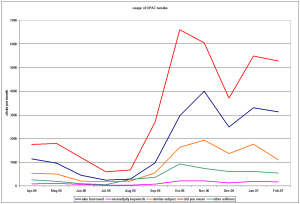
Being an academic site, usage of all library services varies by month — usage drops heavily during summer, and dips during Christmas and Easter.
You can easily see that “did you mean” and “people who borrowed this” are the most heavily used.
The “people who borrowed this” and the “similar subjects” tweaks are both ones that promote serendipity when browsing items — you’re viewing one book but are being given links to other relevant items.
Although the “serendipity keyword suggestions” is the least used feature (partly because it only appears under certain circumstances), it’s getting enough usage to justify the couple of hours coding it took.
Here’s a breakdown of the average number of daily clicks, along with the peak number of clicks each tweak has received in a single day…
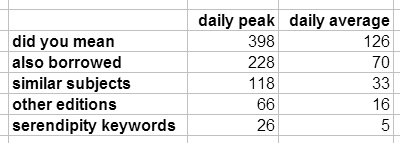
Usage by day
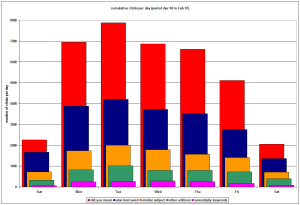
It’ll be interesting to see if Tuesday is also the busiest day for other library services.
Usage by tweak
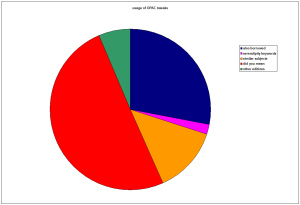
There’s almost a doubling in usage going on here from the “serendipity keywords” to the “did you mean”. I said it last time and I’ll say it again now — if you don’t have a spell checker on your OPAC, then you need to hire a web developer and add one a.s.a.p.!
Usage per hour
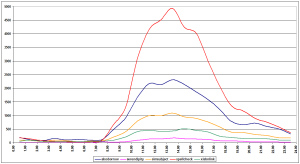
That odd little bump in usage around 5pm has smoothed out now.
Conclusion
Even with the least used tweaks, there’s more than enough usage to justify the development time, so I’m extremely happy with the graphs.
Assuming I don’t get run over by a bus, call back next year to find out if the usage has increased!
wine + coding + book covers = something
I’ve made something, but I’m not too sure what it really is or if it’s of any use what-so-ever!
I started playing around with the “relationships” code (briefly mentioned here) to see what would happen if you selected multiple books and ranked the aggregated suggestions by frequency of appearance.
For example, here are 4 O’Reilly books that I’ve selected. The code pulls in the list of suggestions for each book, then (underneath the line) displays the books that appear in all 4 lists, followed by the ones that are only common to 3 lists, then 2, then those that only appear in one of the lists (with up to 100 being displayed in total).
So, in theory, if I’d picked up those 4 books and was looking for a couple more to borrow, then “PHP & MySQL Web Development” and “HTML & XHTML” should be safe bets.
You can click on any of the books above the line to remove it from the selection. If you click on “HTML” and “Web Based Applications” books to remove them, then you should be left with the “PHP” and “MySQL” books — in that case, a book on e-commerce becomes the first suggestion.
To start with a random book, use the following link and reload the page until you find one that interests you and that has several suggestions…
https://library.hud.ac.uk/perl/relationships2.pl
…then try adding one of the suggested books to the selection (by clicking on it) to see what the revised suggestions are.
So long, farewell, auf Wiedersehen, good night…
As reported at the Gordian Knot, Pat Sommers (CEO, SirsiDynix) has resigned.
I don’t think we were expecting Pat to come to the joint EUUG & Dynix User Group Conference in Barcelona, but it will be interesting to see if anyone from Vista attends.
The conference programme is shaping up nicely, so I’m looking forward to seeing new sights and old friends, as well as making new friends. Just in case anyone is undecided about attending, here’s what the view should be like from your hotel bedroom window…

(Cathedral of Santa Eulà lia)
p.s. if you are planning to attend, please let me know if you’d like adding to the Google Map for the event!
Keeping an eye on your HIP
As promised to the HORIZON-L mailing list, here’s a Perl script we use to monitor our HIP server:
www.daveyp.com/files/stuff/monitor/monitor.pl
Once you’ve downloaded it, rename the file to monitor.pl
In summary, the script checks two URLs and sends an email to one (or more) email addresses if a trigger is reached:
(1) the first check is that your HIP home page is returning a 2xx HTTP status code
(2) the second check is that a HIP keyword search is returning results
Continue reading “Keeping an eye on your HIP”
Baby steps
I like sneaking in new OPAC bits when no-one’s looking and then waiting for people to discover them 🙂
Before Christmas, I was chatting to Kathryn Greenhill in Second Life about OPAC-y (or should it be “OPACeous?”) things, and I turned a vile of green when I discovered that she’s got user ratings on their OPAC at Murdoch University.
I should point out that’s “green” as in “envy” rather than as in “driving the porcelain bus“! Having said that, I like to think there might be at least a couple of ultra-conservative librarians out there somewhere who do get nauseous whenever they see Web/Library 2.0 stuff creeping into that nasty online card catalogue… just like Maggie might do in “Little Britain”:

Anyway, half an hour of frenetic mod_perl and MySQL activity later and we’ve now got something similar on our OPAC:
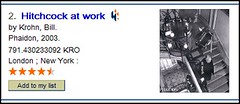

I’d like to add the facility for user comments/reviews too, but for the moment I’m happy just take a few baby steps with user ratings.
OPAC search cloud and failed searches
Seeing as I’ve got my head in the clouds at the moment, here’s one showing the most popular keyword search words used on our OPAC during the last 6 months…

www.daveyp.com/files/stuff/opacsearches.html
To be honest, there aren’t too many surprises in there — students studying business & law and the health sciences are the heaviest users of the library.
Unlike Yahoo, not a single person has done a search for “Britney” on our OPAC in the last 6 months …and “yes”, you would get a relevant hit if you did 😉
I’ve also separated out words that appear in failed keyword searches (i.e. they produced no hits) and removed those which did appear in other successful searches — this gives a list of keywords that probably don’t match anything on the catalogue:
- newspapermen (96)
- socail (90)
- buisness (84)
- brantingham (74)
- renew (74)
- metalib (73)
- reserach (72)
- mortor (67)
- vehclos (66)
- gieber (63)
- thoery (63)
- writting (62)
- psycology (59)
- contempory (58)
- donky (51)
- facism (47)
- reserch (46)
- reasearch (39)
- ans (38)
- hypodermic (38)
- ielts (38)
- televison (38)
- estimation (37)
- priciples (36)
- superficial (36)
- immanual (35)
- infomation (34)
- ligament (34)
- tuberclosis (34)
- centuary (33)
- resourse (33)
- topshop (33)
- treetment (33)
- devlopment (32)
- petherick (32)
- proffesional (32)
- quantitive (32)
- stamps (32)
- theorys (32)
- enviromental (31)
- pschology (31)
- statistic (31)
- syringe (31)
- hanbook (30)
- simnet (30)
- stratergy (30)
- intoduction (29)
- pestel (29)
- physio (29)
- pratice (29)
The words in bold are valid spellings (according to Microsoft Word) and the figure in brackets is the number of separate searches that contained the word.
Compared to the cloud, this is much more interesting…
1) many of them are simple typos — another good reason to add a spellchecker to your OPAC if you haven’t got one!
2) the fifth most common word is “renew” — are our users trying to renew their books by typing the word into the OPAC, or are they expecting the OPAC to work like a search engine and return something like “How to renew your books” as the first result?
3) the sixth most common word is “metalib” — it looks like a lot of people are trying to find help on using MetaLib in the OPAC… maybe we should create a dummy catalogue record that contains 856 links to MetaLib and our Electronic Resources Wiki?
4) “mortor” is an oddity in the list… but the entry for “pestel” near the end makes me wonder if people were searching for “mortar and pestle”?
Outside of the top 50, there are some other interesting failed keywords (with links to Wikipedia or other sites when relevant):
The tie-dyed OPAC ball
This Second Life (SL) hack is slightly more useful and is my first attempt at integrating OPAC functionality into a SL object…

Continue reading “The tie-dyed OPAC ball”
export from the OPAC to del.icio.us and LibraryThing
Yesterday, during Brian Kelly‘s opening session on Web 2.0 at the CILIP “Fly in the Web: Power to the User” event at Leeds Met, I started to think about ways of our linking library stuff into del.icio.us…
One of the things I’ve already hacked into the OPAC is the ability for a user to see their lending history — you can see a bit of it at the foot of this screen shot:

So, I decided to play around with the del.icio.us import facility to see if it was possible to export the lending history from the OPAC and then import it.
The first thing I did was to get a version of the lending history in a suitable format (see Netscape Bookmark File Format). You can see my bookmark file at this URL:
https://library.hud.ac.uk/history/5/5d/5da5fe138f7cf2…html
(I should point out that my library card gets used for a lot of testing, so I haven’t really borrowed everything on there… honest!)
If you look at the HTML source for the page, you’ll spot that I’ve included the tag “hudunilibrary” and (when available) the ISBN for each item. Each item also has a description for the last checked date & time (I’m still not sure if I should include that info?).
Once you’ve got the bookmark file, you then need to save it to your hard drive and run the import process in del.icio.us:

The only real potential problem is that del.icio.us automatically marks all imported links as “private” — so, if you want to share your lending history, then you need to manually update every link (very tedious!). Anyway, I’ve shared a few just so you can see the tag in action:
http://del.icio.us/tag/hudunilibrary
The import facility at LibraryThing is able to pick out the ISBNs in the bookmark file, so it’s also possible to transfer a subset of the lending history into there:
http://www.librarything.com/catalog_bottom.php?tag=hudunilibrary&view=daveyp
The Dynix/Horizon OPAC also has a “My List” facility, so I might see if it’s possible to hack that to output a suitable bookmark file as well.
I did mean to take a few photos at the CILIP event, but totally forget until Sheila Webber was halfway through her session on blogging — anywhere, you can find a couple of photos here. I think someone may have taken a shot of me during my workshop session, although I’m not really the most photogenic of people!